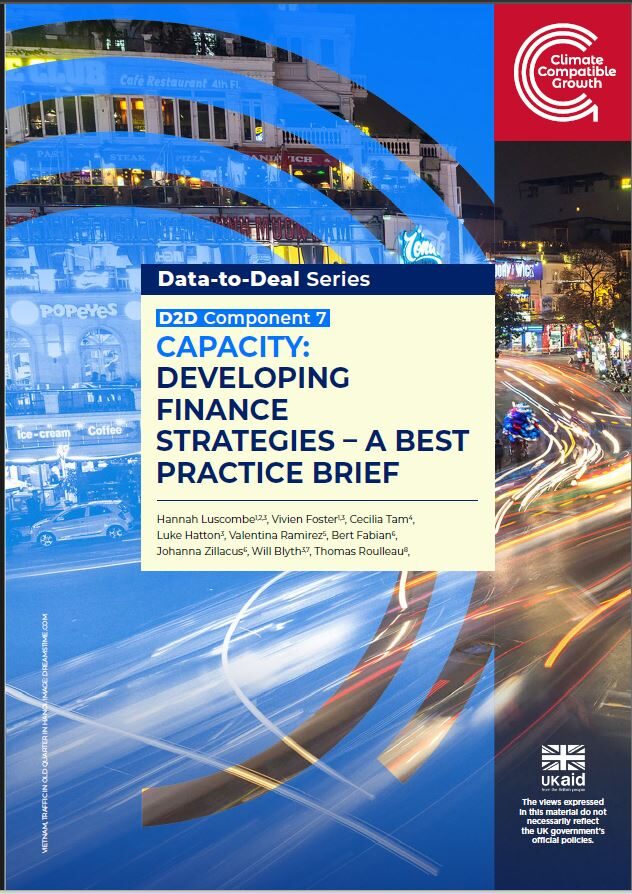
DATA-TO-DEAL @COP30: A PROVEN APPROACH WHOSE TIME HAS COME
CCG was excited to be present at COP30 in Belem Brazil. The focus of our engagement this year was on Data-to-Deal
Read our COP30 D2D Blog here. Watch our D2D Video here.
We highlighted emerging applications of the D2D framework in Africa as well as launching a major new series of seven best practice policy briefs providing detailed guidance on how to implement each component of the D2D framework. You can read them here.
We also had an exciting programme of Blue Zone and Green Zone events working alongside a wide range of partner institutions, across the transport and energy sectors. Key highlights of our events programme together with a day-by-day listing of our events can be found below.
Our event to launch the D2D policy briefs – Data-to-Deal: A Guide for Practitioners – took place on Wednesday 12 November (15.00-16.00) in the GAUC Pavilion.
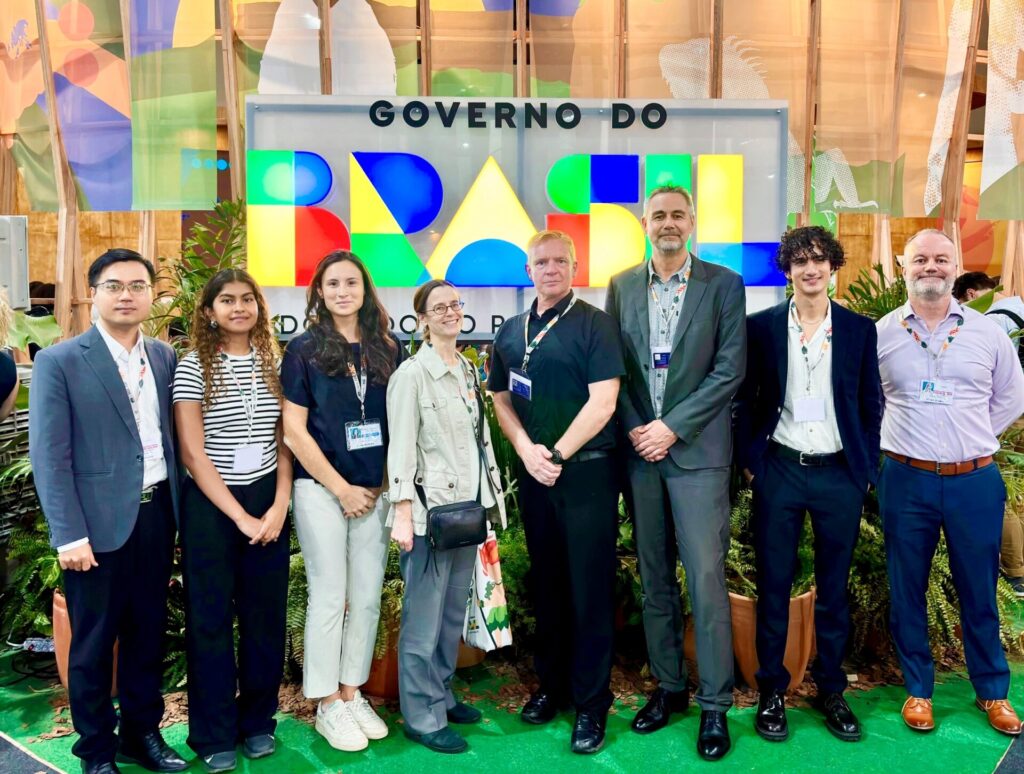
The CCG delegation at COP30 comprised Mark Howells (Director), Vivien Foster (International Partnerships Lead), Carla Cannone (Partner Engagement Coordinator), Holger Dalkmann (Transport Lead), Tom Alfstad, Chingaroom Ajike (Country Partnerships), Nam Nguyen Hoang (CCG Vietnam), Luke Hatton, and Kavya Abeysundara. We were also joined by Kabwe Mubanga from CCG Zambia.
Photo shows (L-R) Nam, Kavya, Carla, Vivien, Mark, Holger, Luke and Tom
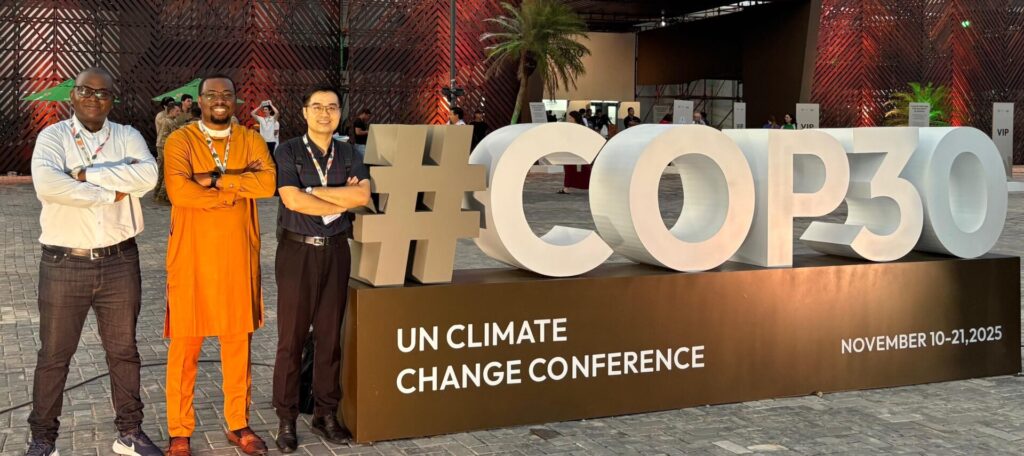
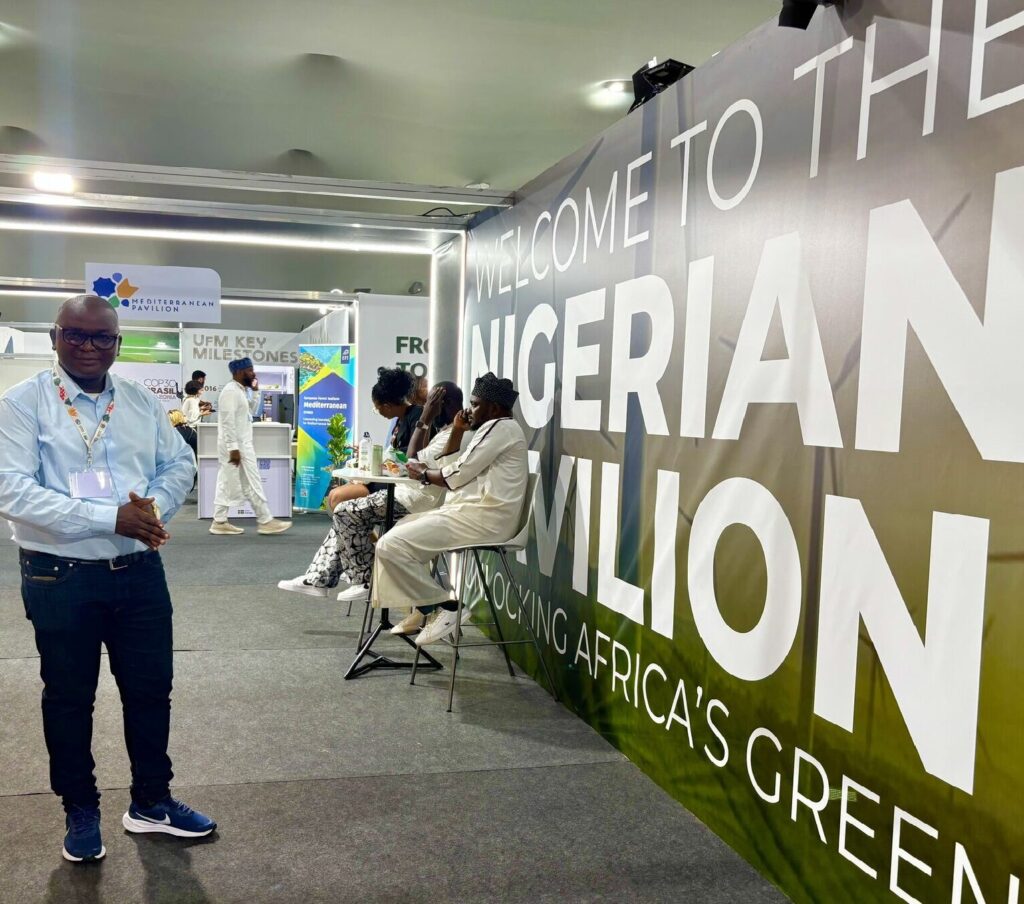
CLICK FOR COP30 HIGHLIGHTS AT A GLANCE
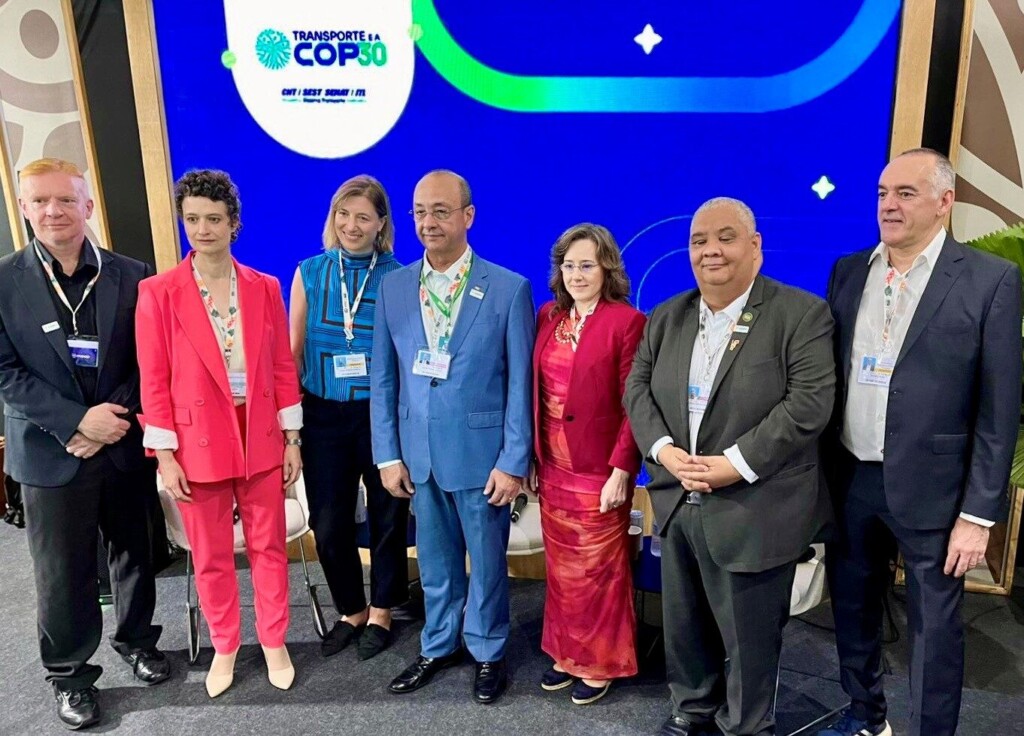
11 November: Opening of the first-ever Transport Pavilion at COP after 20 years without one. We were joined by our partners the Ministry of Transport Brazil, SLOCAT, and CNT. We co-sponsored the Transport Pavilion for the duration of COP30. We contributed to Transport on the Move: From Paris to Brazil and Beyond co-organised by Brazil Ministry of Transport, CCG, Sistema Transporte, and SLOCAT. Holger Dalkmann took part in a Fireside chat: Road to Belem via Paris with Maruxa Cardama from SLOCAT. Finally the Transport Reception in the Green Zone with SLOCAT, FIA Foundation, Kuehne Foundation, Ministry of Transport Brazil and CNT (Confederação Nacional do Transporte). We were honoured to be joined by the Minister of Transport for Brazil.
Photo shows CCG Director Mark Howells (left) with VIP guests including Cloves Benevidesthe Undersecretary of Sustainability at Brazil’s Ministry of Transport (centre in blue)
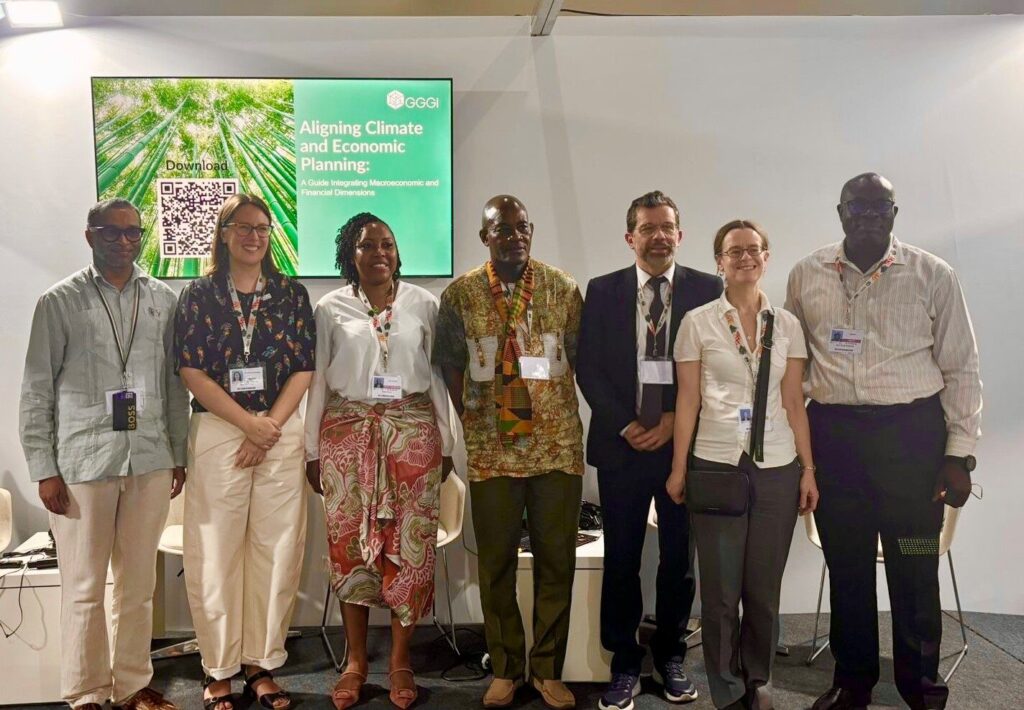
The Missing Link: Macroeconomic and Finance Dimensions in Climate Planning (NDC Partnership Pavilion) This event soft-launched GGGI’s new Guide on Incorporating Macroeconomic and Finance Issues in Climate Planning, demonstrating practical approaches to embed macroeconomic analysis and financial system perspectives in national climate strategies. The session highlighted country experiences in addressing macroeconomic and finance considerations and emerging frameworks.
Photo shows (L-R) Vintura Silva (UNFCCC), Amanda McKee (NDC Partnership), Olola Vieyra (GGGI) Prof Kouadio Kouame Georges (Ministry of National Environmental Policy, Programs and Projects, Cote d’Ivoire), Stelios Grafakos (GGGI), Vivien Foster (CCG) eft) Dr Sam Mugume (Ministry of Finance Uganda)

12 November: a half day of events at the GAUC Pavilion (Global Alliance of Universities on Climate) in partnership with the Grantham Institute. Empowering Countries to Develop Their Own Climate Transitions highlighted CCG’s approach to building capacity for country leadership of NDCs.
How to Finance Climate Transition Plans showcased the finance modelling tools developed by the Imperial College London research team for CCG Countries around the world are developing multi-billion-dollar investment plans for climate transition.
At Data-to-Deal: A Guide for Practitioners Vivien Foster led the presentation of seven briefs on D2D, newly developed for COP30.
Photo shows Mark Howells, Holger Dalkmann (CCG), Tom Alfstad (UNDESA), Marcella Jaramillo (2050 Pathways), Simon Benmarraze (IRENA) and Nguyen Hoang Nam (CCG Vietnam)
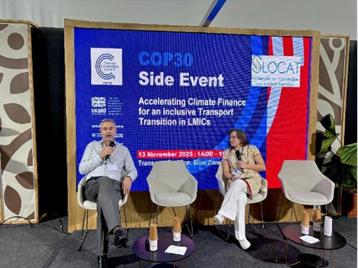
13 November Accelerating Climate Finance for an inclusive Transport Transition in LMICs saw CCG and others explore the urgent need to scale up climate finance for transport systems in LMICs, where investment gaps remain a major barrier to sustainable development. Sustainable transport has secured $334 billion annually but needs $2.4 trillion each year until 2050. The session featured the Data-to-Deal approach which is now being piloted in Asia through a partnership between the UK’s FCDO, CCG, and the Asian Development Bank.
.
Photo shows Holger Dalkmann (CCG Transport Lead) with Maruxa Cardama, Secretary General of SLOCAT
CLICK FOR CCG AT EVENTS ON 11 NOVEMBER
Plan to Accelerate Solutions (PAS) Implementation Workshop – Turning Plans into Progress: Decarbonising Road Transport. (Blue Zone) organised by the Ministry of Transport Brazil and Breakthrough Agenda. CCG’s Holger Dalkmann contributed. The workshop convened the road transport community to reflect on advancing the Plan to accelerate solutions on road transport to the next Global Stocktake, supported by partner initiatives’ progress to date, potential outcomes and enabling collaborative actions to solve implementation challenges. Focus was on strengthening existing partnerships to advance the COP30 Action Agenda and mobilise collective efforts,
• Establishing the Country-Specific GHG Modelling Framework (The Türkiye Pavilion, Blue Zone) with the Government of Türkiye. Mark Howells contributed to the panel that presented Türkiye’s modelling capacity and the preparation process for the 2025 Second Nationally Determined Contribution, It highlighted the roles of different actors involved in the modelling process, shared Türkiye’s experience with other Parties and explored potential areas for collaboration. It demonstrated the direct link between capacity building and enhanced climate ambition.
The Missing Link: Macroeconomic and Finance Dimensions in Climate Planning (NDC Partnership Pavilion) This event soft-launched GGGI’s new Guide on Incorporating Macroeconomic and Finance Issues in Climate Planning, positioning climate planning and finance as a continuum and demonstrating practical approaches to embed macroeconomic analysis and financial system perspectives in national climate strategies. It provided policymakers, relevant Ministries, such as Ministries of Finance and Ministries of Environment, and development practitioners with actionable guidance and emerging best practices to: Align NDCs and long-term low-emission strategies with macro-fiscal realities; Address debt and fiscal constraints while scaling green and climate investment; Strengthen cross-government coordination — especially with ministries of finance, planning, and central banks; Enhance climate policy credibility, investment signals, and economic growth; Move from climate planning to climate and carbon finance mobilization. The session highlighted country experiences in addressing macroeconomic and finance considerations and emerging frameworks.
CLICK HERE FOR EVENTS ON 12 NOVEMBER – DATA TO DEAL DAY
Empowering Countries to Develop Their Own Climate Transitions, GAUC Pavilion highlighted CCG’s approach to building capacity for Country Leadership of NDCs.
Click for more information on Empowering Countries to develop their own Climate Transitions
Developing technically feasible and politically viable national decarbonisation pathways poses numerous challenges, especially for developing countries. Often, technical assistance programmes offered by international organizations rely on external consultants to overcome limitations in local institutional capacity. While this approach may deliver analytics rapidly, the resulting plans are typically not fully owned or informed by local counterparts and are likely to prove unsustainable as a result.
CCG has been developing an approach that focuses instead on empowering local analysts to conduct their own modelling of climate transition pathways and ultimately to embed this in local institutional processes. Under this approach, external actors (like CCG and partners) play a facilitating role, with the main objective being to build sustainable capacity for planning in country, working across the entire academic and policy-making ecosystem. This event will explore experiences from CCG partner countries in using the resources and training that CCG offers to develop their NDC and other climate strategies. It will highlight lessons learned, best practices, and the impact of locally led modelling and decision-making on the development of national decarbonisation pathways.
How to Finance Climate Transition Plans, GAUC Pavilion highlighted CCG’s finance tools built with research from Imperial College, London.
Click for more information on How to Finance Climate Transition Plans
Countries around the world are developing multi-billion-dollar investment plans for climate transition. Planning efforts typically focus on technical considerations and the required rollout of clean technologies, with financing coming as an afterthought, and many transition plans consequently lacking financial realism. With growing calls for transition planning efforts to be more closely aligned with, and informed by, considerations around downstream capital mobilization, this session will showcase new analytical tools developed by CCG. These support countries in understanding the financing constraints that they face and identify the most relevant sources of concessional finance. A case study from Zambia, will be used to illustrate the application of these tools to develop a financing roadmap for the country’s Integrated Resource Plan, with opportunity for discussion of challenges, opportunities and key learning points unlocked from this experience.
Data-to-Deal: A Guide for Practitioners, GAUC Pavilion Building Capacities for Energy Planning: International Support for Sustainable Development. Vivien Foster will led the presentation of seven briefs on D2D, newly developed for COP30.
Click for more details on Data-to-Deal: A Guide for Practitioners
Data-to-Deal is a proven and comprehensive framework for supporting countries through the entire climate transition process, ranging all the way from upstream political facilitation and technical work, through to downstream financial mobilisation. The Data-to-Deal framework – developed by Climate Compatible Growth with a wide consortium of partner institutions – draws on the experiences of several countries across Latin America, which successfully mobilized $11 billion of climate finance.
For COP30, Climate Compatible Growth together with some 20 international organizations, wrote a collection of “best practice” briefs providing detailed guidance on implementation for each of the seven components of the Data-to-Deal framework. This event presented these new practitioner resources and provided a platform to reflect on the key insights and challenges that have emerged throughout their development over the past year. It also explored how best practices can support countries in translating robust data and analysis into actionable investment strategies for the energy transition.
Vivien Foster (CCG and Imperial College London) Chaired. Prof Mark Howells (Director CCG) introduced the D2D Best Practice Briefs and there was a round table of contributors featuring Simon Benmarraze, Head of Innovation & Technology Centre, IRENA, Marcela Jaramillo, Executive Director, 2050 Pathways Platform and Professor Nam Nguyen, National Economics University, Vietnam among others.
Building Capacities for Energy Planning: International Support for Sustainable Development SDG Pavilion Blue Zone We joined IAEA to share examples of collaboration between international organizations and member states on capacity building of local experts (with a focus on CLEWs).
CLICK HERE FOR EVENTS ON 13 NOVEMBER – TRANSPORT DAY
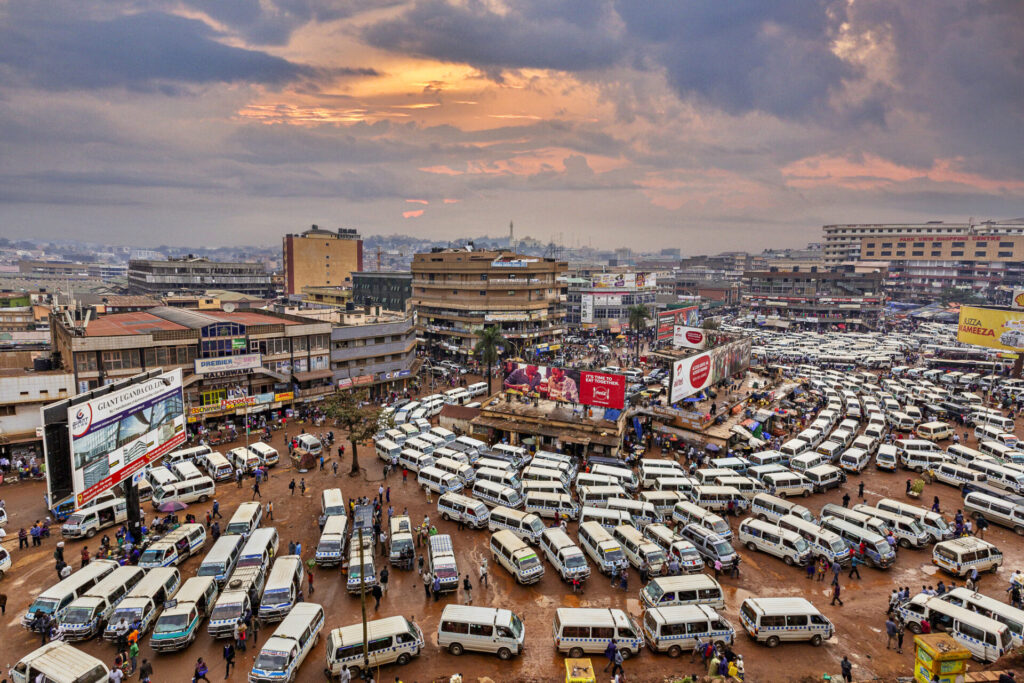
Accelerating Climate Finance for an inclusive Transport Transition in LMICs – Transport Pavilion, Blue Zone This session with SLOCAT explored the urgent need to scale up climate finance for transport systems in LMICs, where investment gaps remain a major barrier to sustainable development.
CLICK HERE FOR EVENTS ON 14 NOVEMBER – ENERGY DAY
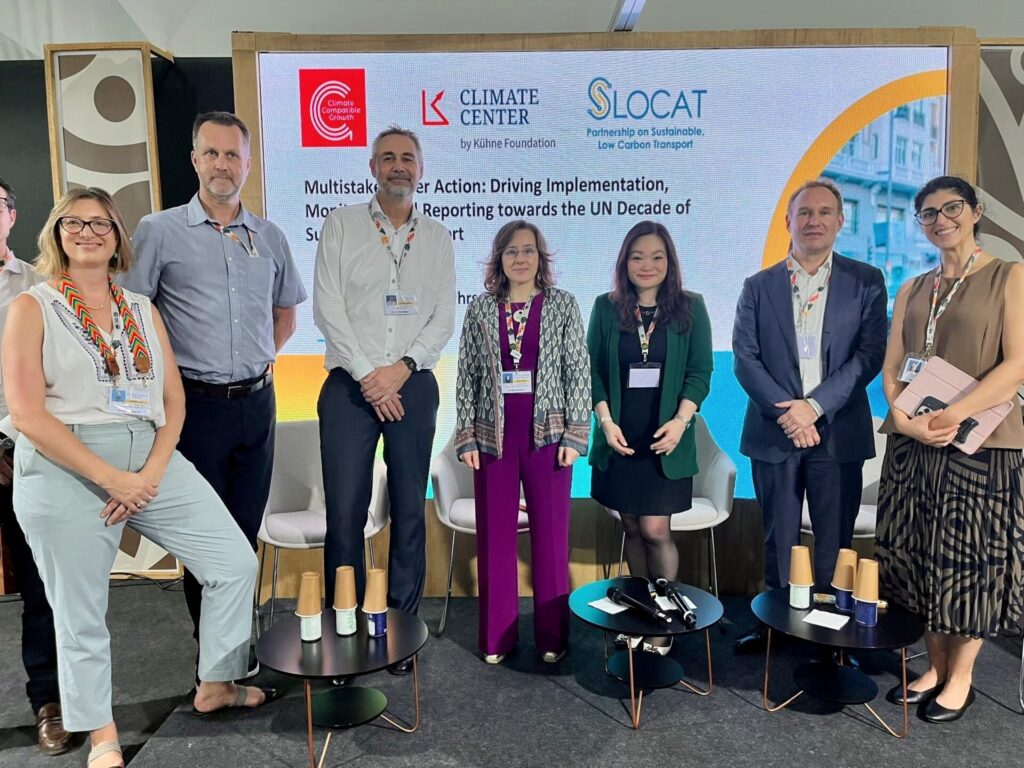
Improving Climate Finance for Transport Infrastructure in Latin America and the Caribbean CAF Pavilion Blue Zone CCG, together with SLOCAT and GIZ, explored the synergies between sustainable transport and climate finance.
UN Decade of Sustainable Transport Transport Pavilion Blue Zone CCG, The Kuehne Foundation, and UNESCAP shared voluntary commitments for the Decade (CCG through the Transport Data Commons Initiative), and discussed the potential outlook for the Decade.
CLICK HERE FOR EVENTS ON 15 NOVEMBER – ENERGY DAY
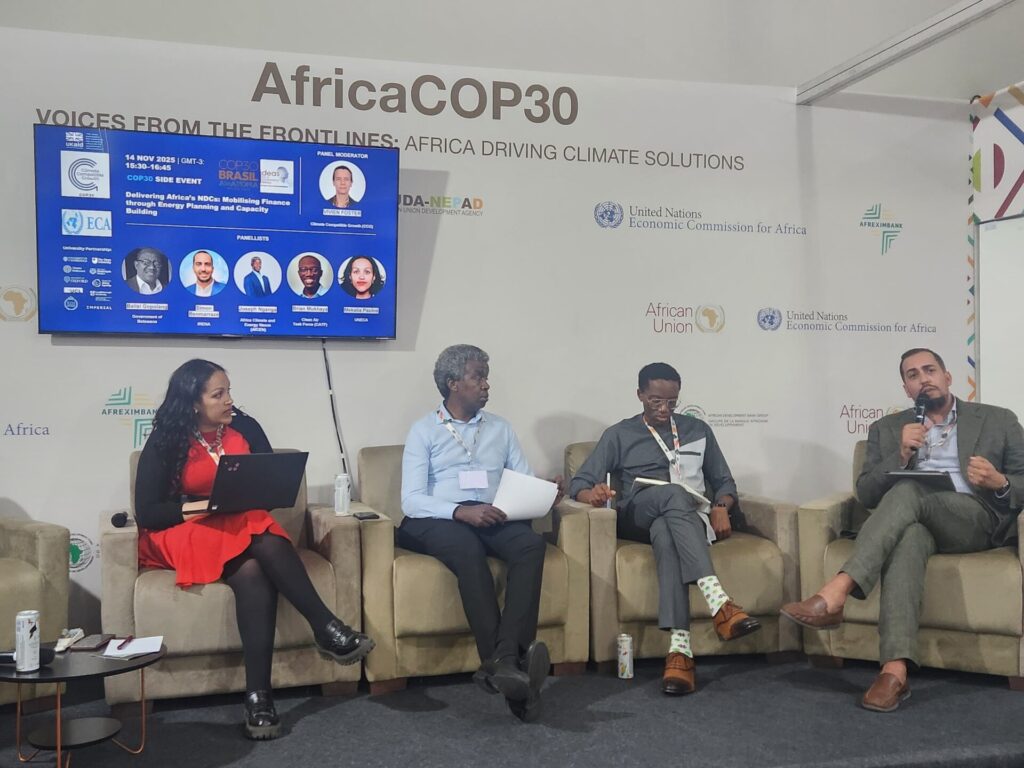
In the African Pavilion, as part of Energy Day organised by UNECA, we took part in Delivering Africa’s NDCs: Mobilising Finance Through Energy Planning and Capacity Building. This session highlighted how UNECA, CCG, 2050 Pathways, and partners are supporting African governments and institutions to strengthen planning systems, build capacity, and mobilise finance for NDC implementation.
Energy Investment and Financing Tools, UK Pavilion . We joined one of two panels on country workplans and financing tools, alongside GCPA, the UK Government and BEIS.
Launch of the Power Transmission Acceleration Platform (PTAP) IDB Pavilion, Blue Zone organised by Green Grids Initiative, CCG and UCL. We chaired the panel.
We spoke at the Global Coalition for Energy Planning (GCEP) with the Brazilian Ministry in attendance, followed by a Reception. This was organised by GCEP and IRENA.
CLICK HERE FOR EVENTS ON 17 NOVEMBER
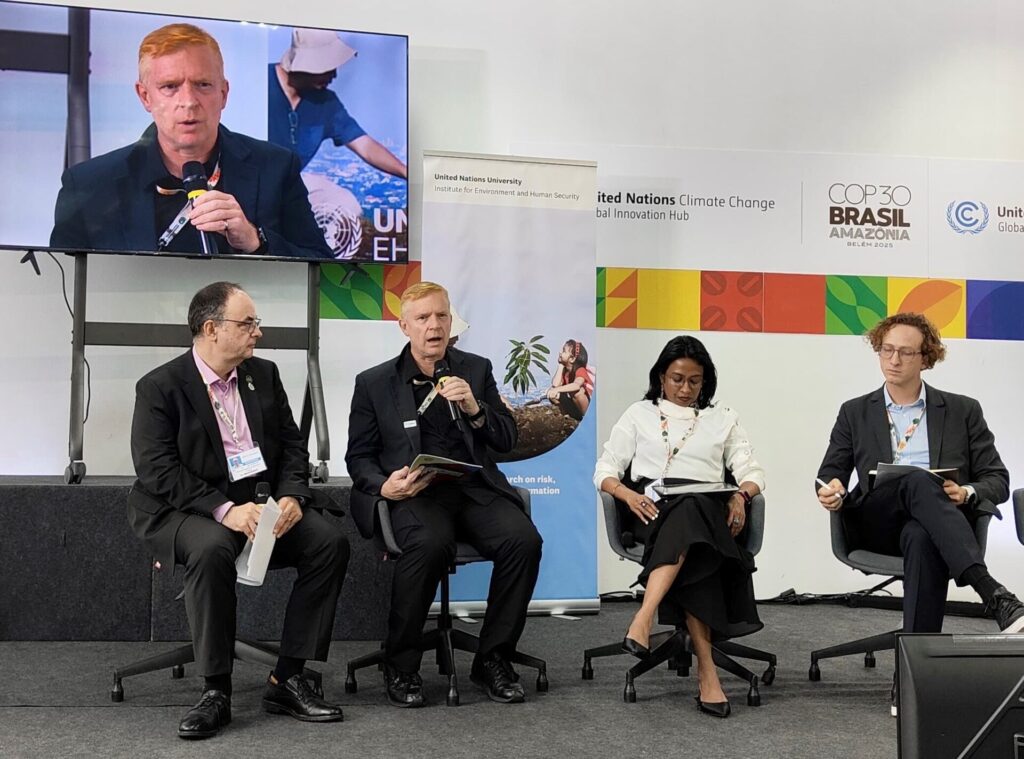
Building institutional foundations for climate finance readiness 7th Capacity Building Hub organised by PCCB and UNFCCC. This session broadly aimed to explore strategies for establishing institutional frameworks that support climate finance planning, access, and implementation and highlight good practices. Mark Howells contributed to this session.
CLICK HERE FOR EVENTS ON 18 NOVEMBER
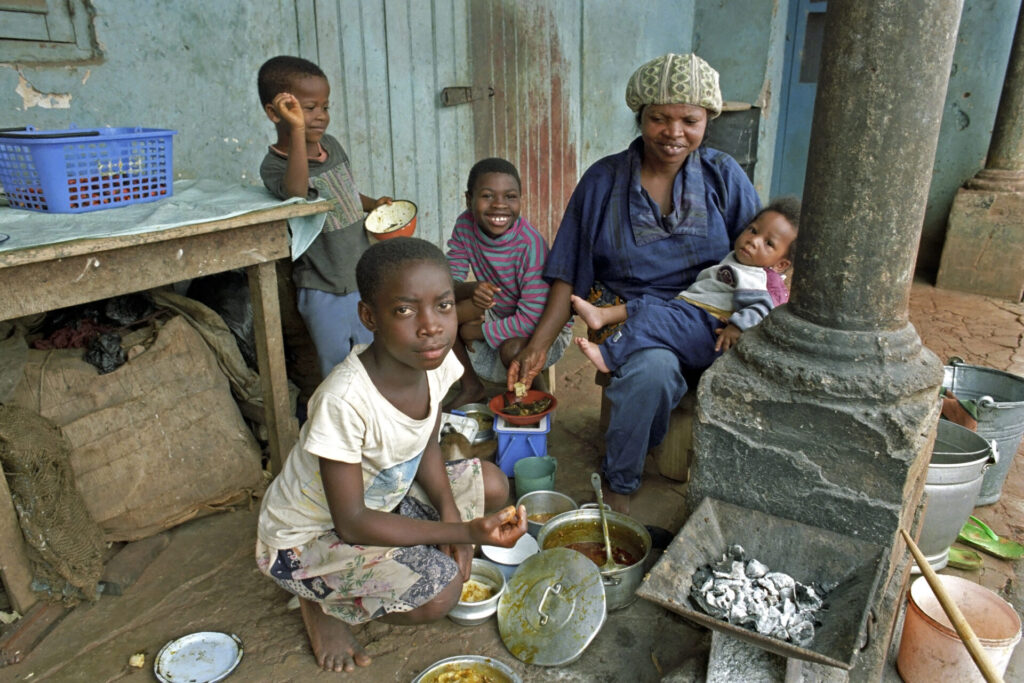
UN Side event: Financing Strategies for Low Carbon Energy Sources, Side Event Room 5 (16.45-18.15) organised by the IAEA. CCG will be speaking about energy planning and Data-to-Deal approaches.
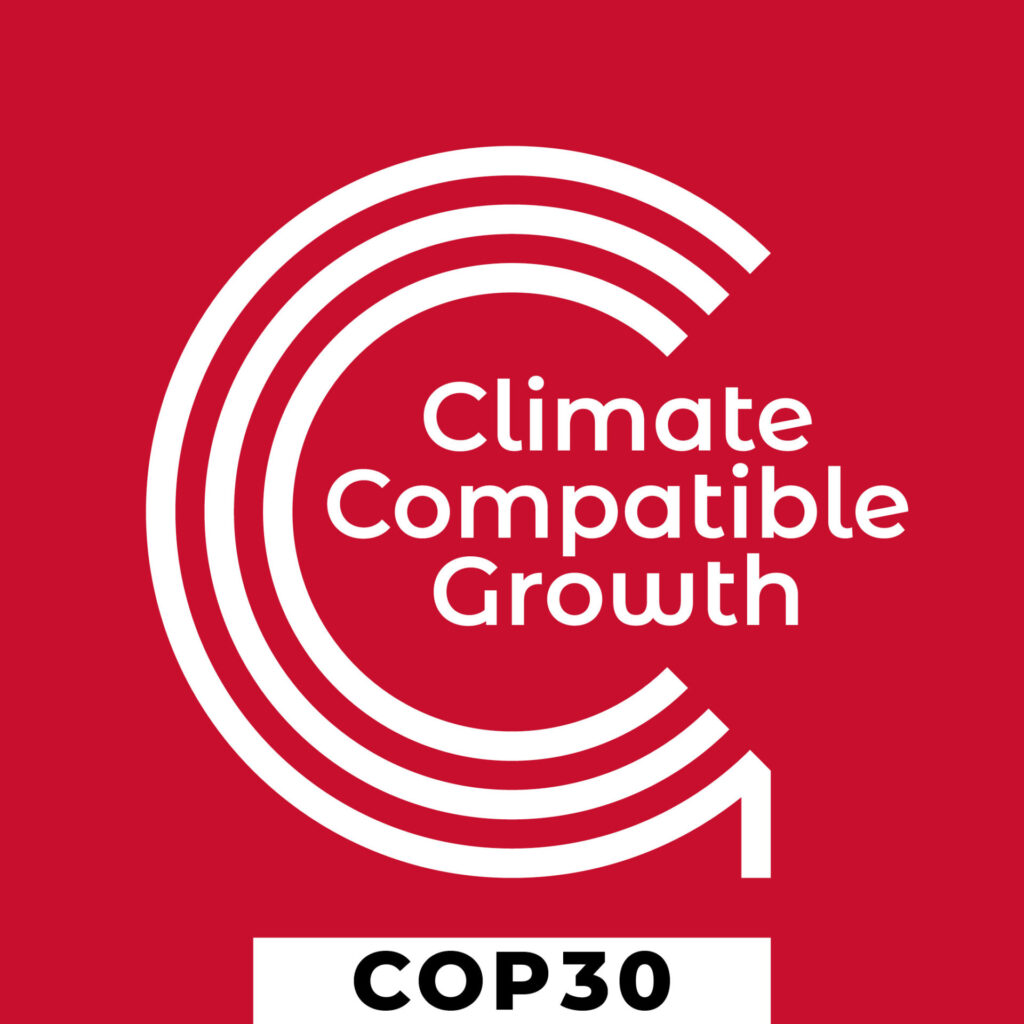
CCG at COP 29
To reflect COP29’s themes we focussed on the following themes, and published policy briefs for each of them:
D. Green Grids
Themes and Attendance and Publications
We published work on climate start-ups and renewable energy entrepreneurship from the Global South through a Blue Zone event at the SE4All Pavilion. In transport, we promoted Data-to-Deal (D2D) thinking with the launch of the “D2D Transport in Asia” report in collaboration with ADB, followed by a side event with WRI and SLOCAT.
CCG also showcased new MinFin case studies at a climate finance event, contribute to a GGI-led discussion on principles for financing power transmission lines.
CCG held side events during COP. One of these focussed on Transport and one launched the Energy Modelling Community which is a network for anyone who has completed energy modelling training at a CCG Summer School.
If you would like to see the policy briefs from COP28 in Dubai, please use the links below:
Global Community Support for LMIC Fossil Fuel Producers
Analytical Tools to Support Transport Sector Decarbonisation in LMICs
Affording the Climate Transition (MinFin)
Towards Equitable Climate Compatible Transport Pathways in Kenya
CCG at COP28
CCG at COP28
At COP 28, we implemented a comprehensive programme of side events with the aim of engaging in the global policy discussion, increasing awareness of CCG’s activities, and promoting dialogue with partner organisations. Some of the highlights of the events programme were:
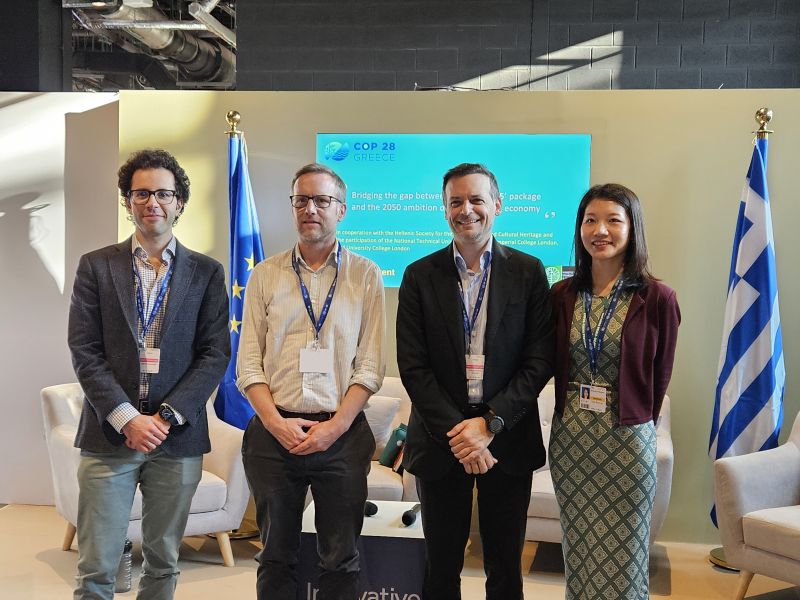
Three CCG-organized side events in the UNFCCC Blue Zone, with proposals selected from among hundreds of competitors. These included events on accelerating development of national knowledge ecosystems, supporting transition pathways for fossil fuel producing LMICs, and mobilizing investment in Zambia.

A major milestone for CCG was the launch of Uganda’s Energy Transition Plan, which commits the country to reach net zero by 2065. This was the result of a partnership between CCG and IEA, in which CCG provided the open-source software and capacity-building efforts that allowed Ugandan government planners to play a driving role in the technical analysis and development of the plan.


Members of our team were invited to participate as chairs or panellists at more than 20 Blue Zone side events organized by other partner institutions, including ADB, ETC, IAEA, IRENA, LDC Negotiators, UNEP and UNFCCC among others.

Climate Parliament co-organized – with the European Climate Foundation – a two-day Investment Dialogue Forum on Green Grids, which attracted significant participation from MPs from around the world and led to a statement signed by 22 MPs committing to greater climate ambition and action.

CCG organized 20 off-site side events, including CCG days on the Transport Sector and Data-to-Deal. The CCG Transport Day – co-organized with ADB, HVT, SLOCAT and WRI – was particularly well-attended and attracted sponsorship from the UN Under-Secretary General and Executive Secretary of UNECE, and senior participation from GIZ as part of the run-up to the Hamburg Sustainability Conference in June 2024.

Over 50 bilateral meetings were held with heads of IRENA, SEforAll, World Energy Council, and senior leaders in AfDB, ASDB, IEA, WB, WRI.

We also launched the Electricity Transition Playbook, and two significant new research papers, one on the role of cross-border interconnectors in the global energy transition, and one on the economic predicament of fossil fuel producing LMICs
CCG is a UK Aid-funded project which aims to support investment in sustainable energy and transport systems to meet development priorities in the Global South. The programme brings together some of the UK’s leading universities including UCL, Oxford, Cambridge, Imperial College, the Open University, Strathclyde University and Loughborough University, with the Centre for Global Equality, KTH Royal Institute of Technology, Sustain 2030, and Climate Parliament. It is directed from the Centre for Sustainable Transitions: Energy, Environment, and Resilience (STEER), at Loughborough University. Our team includes experts in practical, applicable research in sustainable development and related topics.










